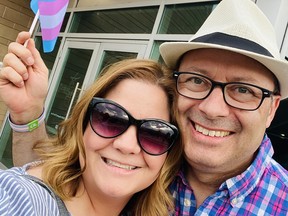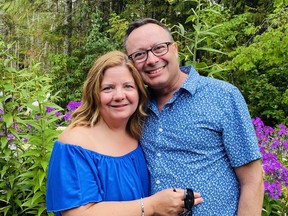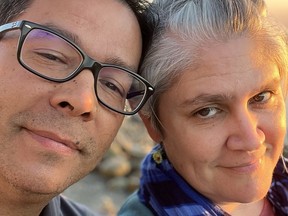Gender-affirming care is how the health system supports young people while acknowledging their gender identity and expression.

Article content
When Kelowna resident Carrie Broughton told her father about her transgender son, she expected resistance due to the number of misinformation online about how genderqueer youth receive health care.
But he said, “This is great!” and told her that he was happy that his grandson was living his authentic self.
“I think if we come from a place of love, we’re all able to understand each other … no matter how old they are,” Broughton said.
Advertisement 2
Article content
Broughton, along with her husband Wayne, are among several parents and health professionals who are speaking out to combat misinformation about gender-affirming care for trans, bi-spirit and non-binary youth.
The Broughtons are grateful for the community and medical support they received during their son’s transition, but acknowledge that it can be difficult for others to find that support.
“What we found is that the more people we met – our GP, pediatrician, psychologist and friends in the community – we started to feel less alone. We started to feel better about dealing with this.”
That’s just one of the reasons they’ve joined a national campaign with health experts from BC’s provincial health authorities called We Are Allies, which aims to provide factual information about gender-affirming care for young people.

“We’re all entitled to our own opinions on things and it’s okay to have different opinions. That’s what makes life beautiful,” Broughton said. “But I just want to make sure that anyone’s opinions that they’re going to have about our family are based on facts and truth.”
Article content
Advertisement 3
Article content
The mother of two admits it hasn’t always been easy having to explain to people what transgender means, and she’s lost a few friends along the way. But seeing the positive change in her son has been worth it.
“It was as if his anxiety was relieved. And you know it’s not just bright and perfect, because we’re all human. But the difference is amazing, kind of fascinating,” she said.
Doctors at the BC Provincial Health Services Authority say misinformation about gender-affirming care has reduced public understanding of how gender-sensitive children and youth are provided medical care.
The campaign comes as several US states push for restrictions on access to care for transgender youth, which Broughton says is difficult to track.
“I don’t think we should be politicizing a group that is already one of the most vulnerable,” she said.
Gender-affirming care is a form of health care within the provincial system that supports people with their gender identity and expression. It can include health care, mental health services, and medical interventions, such as menopause and hormone therapy.
Advertisement 4
Article content
Dr. Ingrid Cosio, medical director of Trans Care BC, which has a clinic in Prince George, says this type of care allows transgender youth to thrive in the community.
Trans Care BC is the provincial health authority’s provincial clinical program, a leading partner in the Allied Campaign.
“It is difficult for people to distinguish between what is good information based on facts and research and what is not. So that’s part of what the campaign is meant to do, to clear up some of the major misinformation that’s out there and has been for a number of years.”
For example, Cosio said, some people believe that babies are being operated on or that birth control pills are permanent, both of which are not true.
She said many people still don’t understand that puberty can give a person time to make decisions about their future care and that the blockers stop working when the patient stops taking them.
And she noted that research has shown that access to puberty blockers reduces suicide rates, self-harm and depressive symptoms.
“Gender confirmation surgery is something that’s a long process in terms of working towards that goal … and it’s something that’s for people 18 or older. Certainly not in children,” Cosio said.
Advertisement 5
Article content
She said that with birth control pills, hormone therapy or surgery, it’s a long process of getting to know the patient, their families, and working towards their goals as a genderqueer.
Mikara and Christopher Pettman from Victoria, who are also part of the Allied campaign, have two transgender children, both now young adults.
Mikara said the beginning of their journey with their transgender son a decade ago was a challenge as she and her husband did not understand what was happening.
“When our child told us he was trans, we didn’t really know anything about it, so we came from a place of ignorance, didn’t really understand gender diversity because we weren’t taught it in school,” she said.
“But we supported as best we could unconsciously.

The Pettmans are Aboriginal, and she said through community support, she learned that there have always been two-spirit people in Aboriginal culture.
“So a two-spirit person has a place in society. They come in, as opposed to coming out, right? You come in, you’re part of a community,” she said.
Advertisement 6
Article content
“A diverse identity has been here since time immemorial. We learned that it is a healthy and important part of human societies. And it’s just so much joy.”
She said the Allied Campaign website is a good place for anyone who may need guidance with transgender Aboriginal children because it includes two-spirit elders who share their knowledge.
“I can’t speak for all Indigenous communities, but I would say it felt like coming home to me and my family when we were embraced by Indigenous knowledge.
You can read more about Pettman and Broughton’s journeys with their intersex children at weareallies.ca
ticrawford@postmedia.com
Recommended by the editorial board
-

BC Raises Pink and Blue Flag at Legislature for Transgender Day of Visibility
-

BC Ferries offer free menstrual and beauty products for all genders
-

As Canada approaches a turning point on hate, it’s important to advocate for transgender equality
Bookmark our website and support our journalism: Don’t miss the news you need to know – bookmark VancouverSun.com and TheProvince.com and sign up for our newsletters here.
You can also support our journalism by becoming a digital subscriber: For just $14 a month, you can get unlimited access to The Vancouver Sun, The Province, National Post and 13 other Canadian news sites. Support us by subscribing today: The Vancouver Sun | The province.
Article content
#health #experts #bust #misinformation #gender #services #young #people